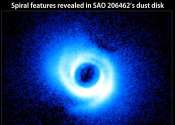The Astronomical Journal (often abbreviated AJ in scientific papers and references) is a peer-reviewed monthly scientific journal owned by the American Astronomical Society and currently published by Institute of Physics Publishing. It is one of the premier journals for astronomy in the world. Until 2008, the journal was published by the University of Chicago Press on behalf of the American Astronomical Society. The reason for the change were given by the society as the desire of the University of Chicago Press to revise its financial arrangement and their plans to change from the particular software that had been developed in-house. The other two publications of the society, the Astrophysical Journal and its supplement series, followed in January 2009.
The journal was established in 1849 by Benjamin A. Gould. It ceased publication in 1861 due to the American Civil War, but resumed in 1885. Between 1909 and 1941 the journal was edited in Albany, New York. In 1941, editor Benjamin Boss arranged to transfer responsibility for the journal to the American Astronomical Society.
The first electronic edition of The Astronomical Journal was published in January, 1998. With the July, 2006
- Publisher
- Institute of Physics Publishing for the American Astronomical Society
- Country
- United States
- History
- 1849–present
- Website
- http://iopscience.org/aj
- Impact factor
-
4.548
(2010)
Some content from Wikipedia,
licensed under CC BY-SA









